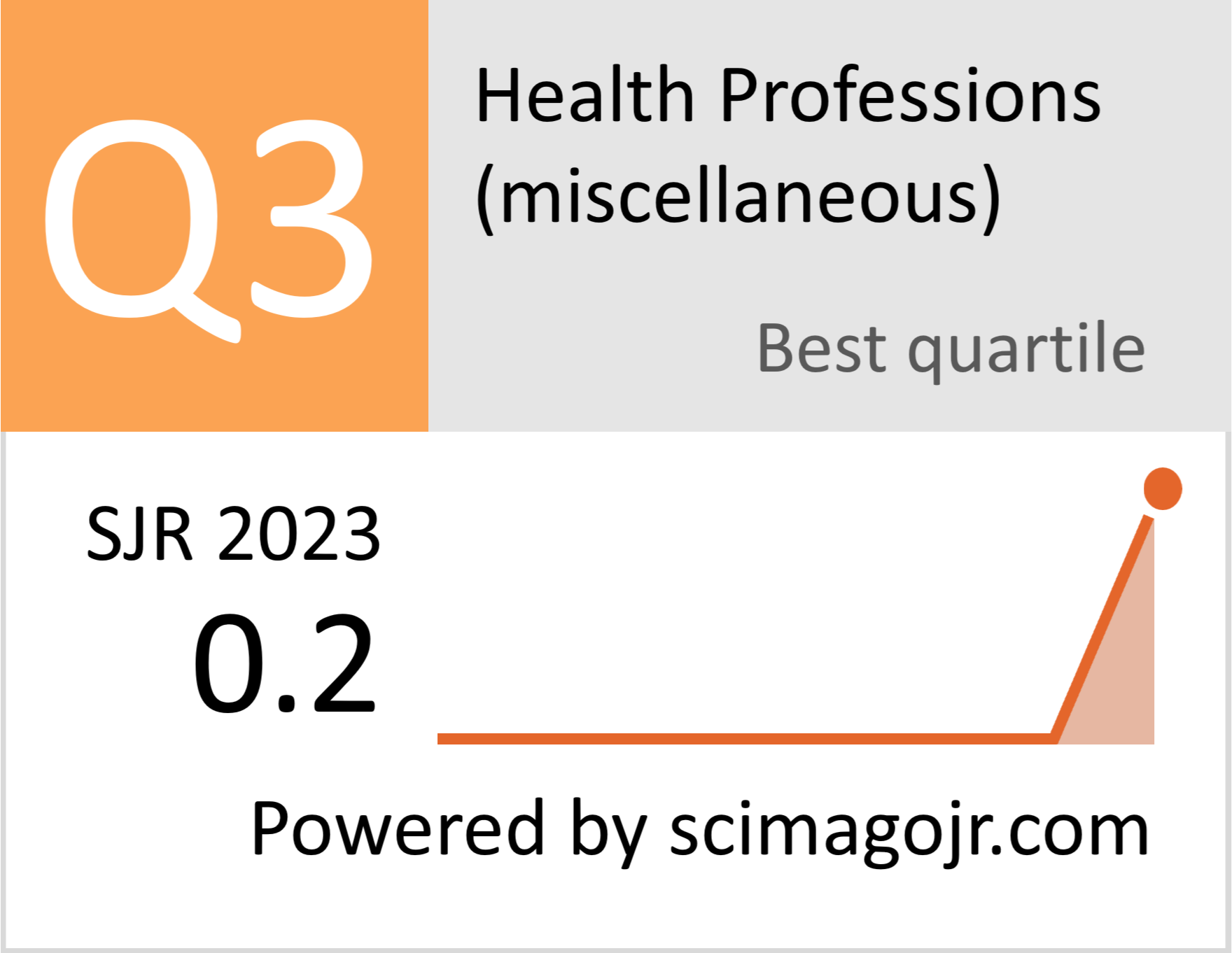Responsiveness of the Voice Handicap Index and its Abbreviated Version, Adapted to Rioplatense Spanish from Argentina (Índice de Desventaja Vocal)
Sensibilidad al cambio del Voice Handicap Index y su versión abreviada, adaptados al español rioplatense de Argentina (Índice de Desventaja Vocal)

This work is licensed under a Creative Commons Attribution-NonCommercial-NoDerivatives 4.0 International License.
Show authors biography
Aim. To evaluate the responsiveness of the “Índice de Desventaja Vocal” (Argentinian version of the Voice Handicap Index) consisting in 30 items (IDV-30) and its abbreviated version (IDV-10).
Methodology. The IDV-30 and IDV-10 were administered to subjects with dysphonia of various etiologies, both before (“PRE”) and after (“POST”) receiving voice therapy. Independent samples were used for each instrument (IDV-30 n = 81; IDV-10 n = 92). The responsiveness of each index and each subscale of the IDV-30 was evaluated using the Wilcoxon test and it was determined whether statistically significant differences existed in scores of different diagnostic groups using the Kruskal-Wallis test.
Results. Participants who completed the IDV-30 required an average of 8.44 therapy sessions while those who completed the IDV-10 required an average of 8.34 sessions. When comparing the “PRE” and “POST”-voice therapy scores of the total IDV-30, as well as each of its subscales and the IDV-10, the difference was statistically significant (p<0.001). There were no statistically significant differences in the score changes obtained by each diagnostic group across any of the indices.
Conclusions. The responsiveness of the IDV-30 and IDV-10 has been confirmed, as statistically significant improvement in scores was evidenced by participants in the study after receiving voice therapy.
Article visits 322 | PDF visits 67
- Jacobson BH, Johnson A, Grywalski C, Silbergleit A, Jacobson G, Benninger MS, et al. The Voice Handicap Index (VHI): Development and Validation. Am J Speech-Language Pathol [Internet]. 1997;6(3):66-70. doi: https://doi.org/10.1044/1058-0360.0603.66
- Feige K, Strauss A, Strauss G. Voice Handicap Index-18 as an Instrument for Assessing Subjective Voice Impairment Between Voice Pre- and Post-treatment. J Voice [Internet]. 2020;34(5):810.e1-810.e10. doi: https://doi.org/10.1016/j.jvoice.2019.04.005
- Rosen CA, Lee AS, Osborne J, Zullo T, Murry T. Development and Validation of the Voice Handicap Index-10. Laryngoscope [Internet]. 2004;114(9):1549-56. doi: https://doi.org/10.1097/00005537-200409000-00009
- Román-Zubeldia J, Farias PG. Adaptación y validación del Voice Handicap Index y su versión abreviada al español rioplatense de Argentina. Rev Investig Innov Cienc Salud [Internet]. 2024 Feb 3;6(1):127-47. doi: https://doi.org/10.46634/riics.265
- Carvajal A, Centeno C, Watson R, Martínez M, Rubiales AS. [How is an instrument for measuring health to be validated?]. Anales Sis San Navarra [Internet]. 2011;34(1):63-72. doi: https://doi.org/10.4321/S1137-66272011000100007
- Ramada-Rodilla JM, Serra-Pujadas C, Delclós-Clanchet GL. Adaptación cultural y validación de cuestionarios de salud: revisión y recomendaciones metodológicas. Salud Publica Mex [Internet]. 2013;55(1):57-66. doi: https://doi.org/10.1590/S0036-36342013000100009
- Lira MT, Caballero E. Adaptación transcultural de instrumentos de evaluación en salud: historia y reflexiones del por qué, cómo y cuándo. Rev méd Clín Las Condes [Internet]. 2020;31(1):85-94. doi: https://doi.org/10.1016/j.rmclc.2019.08.003
- Dimitrov DM. Statistical methods for validation of assessment scale data in counseling and related fields. New Jersey: Wiley; 2014. 259 p.
- Mokkink L, Terwee C, de Vet H. Key concepts in clinical epidemiology: Responsiveness, the longitudinal aspect of validity. J Clin Epidemiol [Internet]. 2021;140:159-62. doi: https://doi.org/10.1016/j.jclinepi.2021.06.002
- Albornoz CR, Pusic A, Danilla S. Evaluation of Surgical Results From the Patient’S Perspective. Rev méd Clín Las Condes [Internet]. 2016;27(1):107-12. doi: https://doi.org/10.1016/j.rmclc.2016.01.013
- Carrozzino D, Patierno C, Guidi J, Berrocal Montiel C, Cao J, Charlson ME, et al. Clinimetric Criteria for Patient-Reported Outcome Measures. Psychother Psychosom [Internet]. 2021;90(4):222-32. doi: https://doi.org/10.1159/000516599
- Behlau M. Voz. O livro do especialista - Volume 1. 1st ed. Rio de Janeiro: Revinter; 2001. 348 p.
- Crisosto-Alarcón J. ¿Cómo construir objetivos operacionales medibles? Una taxonomía de criterios de logro para el monitoreo de la intervención vocal. Rev Investig Innov Cienc Salud [Internet]. 2023 Dec 21;5(2):205-31. doi: https://doi.org/10.46634/riics.230
- García de Yébenes Prous MJ, Rodríguez Salvanés F, Carmona Ortells L. Sensibilidad al cambio de las medidas de desenlace. Reumatología Clínica [Internet]. 2008;4(6):240-7. doi: https://doi.org/10.1016/S1699-258X(08)75545-1
- Rosen CA, Murry T, Zinn A, Zullo T, Sonbolian M. Voice handicap index change following treatment of voice disorders. J Voice [Internet]. 2000;14(4):619-23. doi: https://doi.org/10.1016/S0892-1997(00)80017-X
- Núñez-Batalla F, Corte-Santos P, Señaris-González B, Llorente-Pendás JL, Górriz-Gil C, Suárez-Nieto C. Adaptación y validación del índice de incapacidad vocal (VHI-30) y su versión abreviada (VHI-10) al español. Acta Otorrinolaringol Esp [Internet]. 2007;58(9):386-92. doi: https://doi.org/10.1016/S0001-6519(07)74954-3
- Xu W, Han D, Li H, Hu R, Zhang L. Application of the mandarin chinese version of the voice handicap index. J Voice [Internet]. 2010;24(6):702-7. doi: http://dx.doi.org/10.1016/j.jvoice.2009.05.007
- Behlau M, Alves Dos Santos LDM, Oliveira G. Cross-cultural adaptation and validation of the voice handicap index into Brazilian Portuguese. J Voice [Internet]. 2011;25(3):354-9. doi: http://dx.doi.org/10.1016/j.jvoice.2009.09.007
- Taguchi A, Mise K, Nishikubo K, Hyodo M, Shiromoto O. Japanese version of Voice Handicap Index for subjective evaluation of voice disorder. J Voice [Internet]. 2012;26(5):668.e15-668.e19. doi: http://dx.doi.org/10.1016/j.jvoice.2011.11.005
- Menon U, Sheejamol VS, Cherian MP. Validation of Malayalam Version of the Voice Handicap Index. International journal of phonosurgery and laryngology [Internet]. 2012;2(1):1-4. doi: https://doi.org/10.5005/jp-journals-10023-1025
- Bourque JM, Defoy L, Batcho CS, Tremblay P, Gagnon S, Martel-Sauvageau V. Cross-Cultural Adaptation and Validation of the Voice Handicap Index in the Quebec French Population (VHI-QF). J Voice [Internet]. 2020;34(5):811.e1-811.e6. doi: https://doi.org/10.1016/j.jvoice.2019.04.010
- Khoramshahi H, Khatoonabadi AR, Khoddami SM, Dabirmoghaddam P, Ansari NN. Responsiveness of Persian Version of Consensus Auditory Perceptual Evaluation of Voice (CAPE-V), Persian Version of Voice Handicap Index (VHI), and Praat in Vocal Mass Lesions with Muscle Tension Dysphonia. J Voice [Internet]. 2018;32(6):770.e21-770.e30. doi: https://doi.org/10.1016/j.jvoice.2017.08.008
- Costa T, Oliveira G, Behlau M. Validation of the Voice Handicap Index: 10 (VHI-10) to the Brazilian Portuguese. CoDAS [Internet]. 2013;25(5):482-5. doi: https://doi.org/10.1590/S2317-17822013000500013
- Forti S, Amico M, Zambarbieri A, Ciabatta A, Assi C, Pignataro L, et al. Validation of the Italian Voice Handicap Index-10. J Voice [Internet]. 2014;28(2):263.e17-263.e22. doi: http://dx.doi.org/10.1016/j.jvoice.2013.07.013
- Khalaf M, Matar N. Translation and transcultural adaptation of the VHI-10 questionnaire: the VHI-10lb. Eur Arch Otorhinolaryngol [Internet]. 2017;274(8):3139-45. doi: https://doi.org/10.1007/s00405-017-4585-9
- Akhtar S, Dhanani R, Ahmad K. Translation and validation of voice handicap Index-10 in Urdu. A validation study from a tertiary care hospital of Pakistan. J Pak Med Assoc [Internet]. 2018;68(6):904-7. doi: https://doi.org/10.1044/2023_AJSLP-22-00390
- Fujiki RB, Thibeault SL. Examining Therapy Duration in Adults With Voice Disorders. Am J Speech-Lang Pathol. 2023;32(4):1665-78. doi: https://doi.org/10.1044/2023_AJSLP-22-00390



